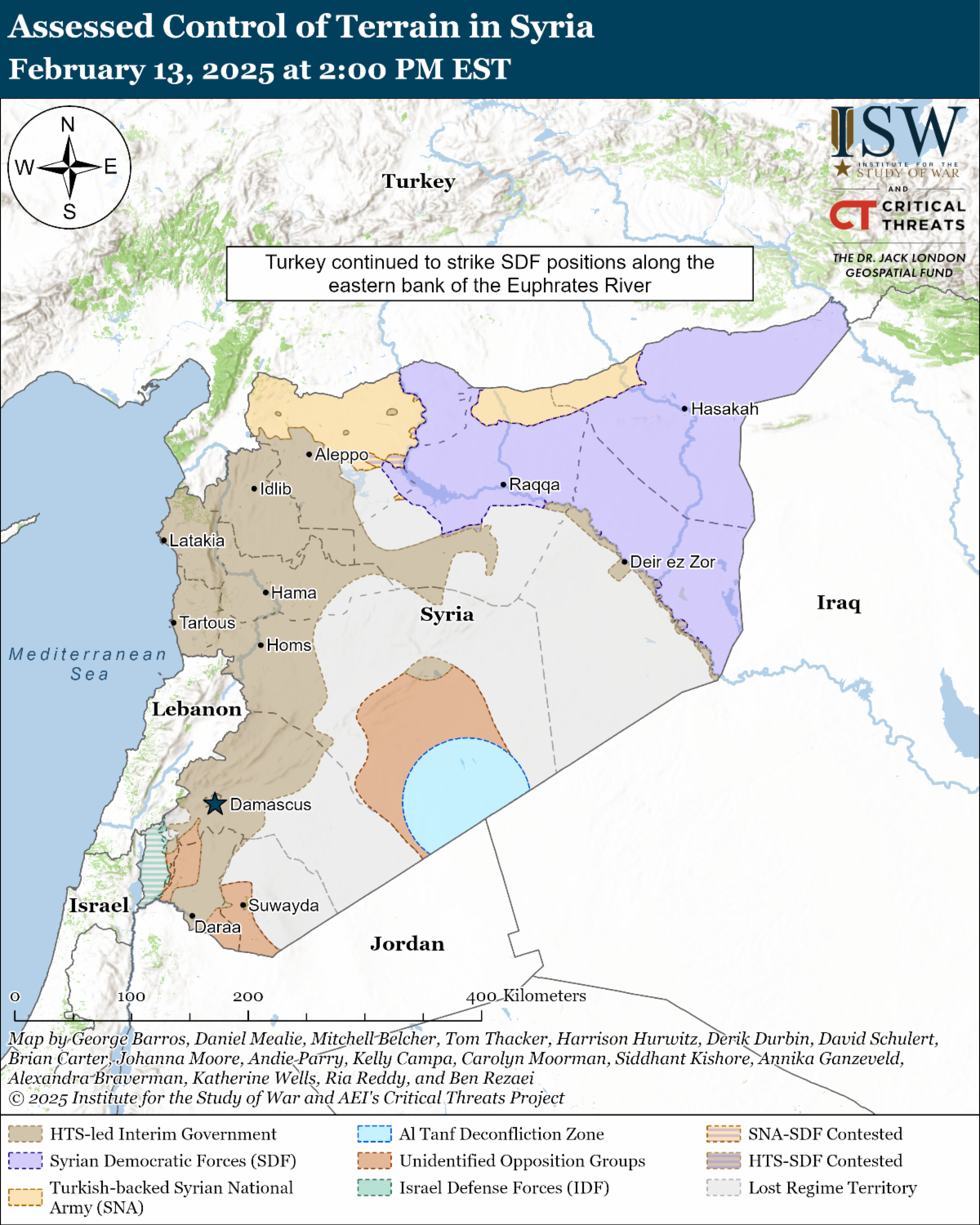The newly-appointed Syrian Preparatory Committee provided some details about how it plans to select representatives to attend the National Dialogue Conference. This conference will reportedly facilitate the drafting of a new Syrian constitution, and therefore, the composition of its attendees will influence the trajectory of the post-Assad Syrian state. The Preparatory Committee is mostly comprised of pro-Hayat Tahrir al Sham figures who are loyal to Syrian Interim President Ahmed al Shara. Preparatory Committee member and spokesperson Hassan al Daghim said on February 13 that armed groups will not be allowed to participate in the conference. This condition most notably bars the Kurdish-dominated Syrian Democratic Forces (SDF) from participating in the conference but also bars southern Syrian armed groups, including the Southern Operations Room (SOR) and the Druze Men of Dignity militia, from participating. The Men of Dignity and SOR have not disarmed but have reportedly made progress toward doing so during negotiations with the interim government. The SDF is also negotiating with the interim Defense Ministry, but CTP-ISW assesses that the SDF is unlikely to give up its ability to defend Kurdish areas against active Turkish-backed attacks by disarming. The SDF’s likely refusal to disarm does not preclude other Kurdish groups from participating in the conference, such as the Kurdish National Council (KNC), which is dominated by the Syrian wing of the Iraqi Kurdistan Democratic Party (KDP).
Israel and Hamas reportedly reached an agreement on February 13 to continue the implementation of the first phase of the ceasefire agreement. Egyptian and Qatari mediators said on February 12 that they succeeded in preventing a breakdown of the ceasefire agreement. Hamas agreed to release three Israeli hostages on February 15 after mediators confirmed that Israel would allow the entry of tents and engineering equipment into the Gaza Strip. An Israeli Army Radio correspondent reported that the ceasefire agreement requires Israel to permit the entry of these materials to enable the construction of makeshift housing for Gazans and the removal of rubble. Several trailers and trucks loaded with heavy machinery gathered near the Rafah border crossing on February 13. Hamas announced on February 10 that it would postpone the release of Israeli hostages, citing alleged Israeli violations of the ceasefire agreement. Israel responded by threatening to resume military operations in the Gaza Strip.
Israeli Strategic Affairs Minister Ron Dermer said on February 13 that the IDF will remain in several positions in southern Lebanon “until Lebanon complies with [its] ceasefire commitments.” Israeli media reported on February 12 that the United States approved an Israeli request for the IDF to extend its deployment in five strategically significant locations in southern Lebanon by ten days, which would be until February 28. The IDF was previously set to withdraw from southern Lebanon by February 18. Lebanese Parliament Speaker Nabih Berri rejected Israel’s decision to delay the IDF withdrawal from southern Lebanon.
Key Takeaways: - Syrian Constitution: The newly-appointed Syrian Preparatory Committee provided some details about how it plans to select representatives to attend the National Dialogue Conference. This conference will reportedly facilitate the drafting of a new Syrian constitution, and therefore, the composition of its attendees will influence the trajectory of the post-Assad Syrian state. A spokesperson for the committee said that armed groups would not be allowed to participate in the conference, which bars the Kurdish-dominated Syrian Democratic Forces but not other Kurdish parties. It remains unclear how the Preparatory Committee will ensure the diversity of conference attendees.
- Iraqi Judiciary: Iran likely pressured members of the Iraqi Shia Coordination Framework to support the General Amnesty Law to prevent conflict between Shia and Sunni parties in Iraq. Iranian-backed Iraqi State of Law Coalition head Nouri al Maliki has continued to try to prevent the implementation of the General Amnesty Law despite Iranian pressure and the rest of the Shia Coordination Framework's consensus to implement the law.
- Israel and Hamas: Israel and Hamas reportedly reached an agreement on February 13 to continue the implementation of the first phase of the ceasefire agreement.
| 



